| Srl | Item |
| 1 |
ID:
127933
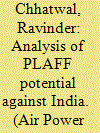

|
|
|
|
|
| Publication |
2013.
|
| Summary/Abstract |
China's growing military build-up and increasing assertiveness against its neighbouring countries has been a reason for concern to many nations. China has territorial and maritime disputes with many of its neighbours . Their major dispute is with Taiwan. Both the countries claim to be the legitimate government of China. China claims to be a part of its territory and has openly stated that it will be ready to use force. If required, to annex Taiwan. China also claims Senkaku islands, also claomed by Japan, as theirs. Another dispute area is Paracel island which is occupied by China but Claimed by Taiwan and Vietnam. China is also involved in a dispute with the Philippines over the Scarborough Shoal. The Spratly islands are another complex bone of contention between China, Taiwan, Malaysia, the Philippines and Vietnam. With India, the border dispute has not yet been resolved.
|
|
|
|
|
|
|
|
|
|
|
|
|
|
|
|
| 2 |
ID:
127901
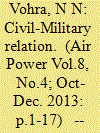

|
|
|
|
|
| Publication |
2013.
|
| Summary/Abstract |
I am very happy to have been asked to deliver the USI national Security Lecture 2013 and to speak on "Civil-Military Relation Opportunities and Challenges".
Before I proceed to reflect on the theme of taday's lecture, I think it would be useful to have reasonable clarity about what exactly do we have in mind when we use the term "civil military relations". I say this because earlier this year, at a seminar held in a defence think-tank at Delhi, a statement was made that "unsatisfactory civil-military relation are having an adverse impact on the functioning of the military in India". While all those who may be involved in studying military matters would understand that this statement refers to the functioning of the defence apparatus, I feel that a free use of the term "civil and military relations" should be best avoided as its has the potential of causing altogether unfounded doubts and suspicions in the minds of millions of people in India.
|
|
|
|
|
|
|
|
|
|
|
|
|
|
|
|
| 3 |
ID:
127942
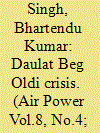

|
|
|
|
|
| Publication |
2013.
|
| Summary/Abstract |
China and India enjoy relative peace between them and have avoided another war after the one fought in 1962. However, at times, there have been clashes and crisis along the line of actual control (LAC) that have put to test the conflict management skills of political and military leadership of both the countries. On each occasion, it shook India's public opinion. The summer crisis in 2013 was no different. As the Chinese PLA seized the opportunity and lay tents almost 19 km inside the Indian side of the Line of Actual Control (LAC) in the Daulti Beg Oldi (DBO) sector during April 15-May 5, 2013, The Indian public opinion was up in arms. The President refusal on the part of Chinese troops to withdraw only raised the stakes in the crisis. Concurrently, the government of India faced unprecedented strong domestic criticism over handling of relation with China in general and the border intrusion in particular.
|
|
|
|
|
|
|
|
|
|
|
|
|
|
|
|
| 4 |
ID:
128052
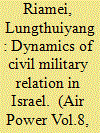

|
|
|
|
|
| Publication |
2013.
|
| Summary/Abstract |
Israel was founded in 1948 in the midst of war and hardship, a period personified by the brave men and women driven by a sense of historic mission to risk everything to protect Jewish lives from assault and military attack. The generation that fought for a Jewish state also had to structure government activities that demand a different kind of boldness in a context tested not by first power but by competing interest goals. Since the creation of the state of Israel, the Jewish population has been defined by military Service. The Israeli citizen was ultimately there to serve in its war against the Arab world, Despite recurrent wars and a perpetual state of alert, Israel has profoundly failed to become a military state. Israel is the only post-World War II democracy in the world that has been in a state of constant war with its neighbours.
|
|
|
|
|
|
|
|
|
|
|
|
|
|
|
|
| 5 |
ID:
128061
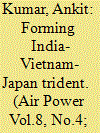

|
|
|
|
|
| Publication |
2013.
|
| Summary/Abstract |
George Fernandes, then India`s Defence Minister, stated in the year 2000 that "Vietnam and Japan are emerging as crucial strategic partners for India especially in the maritime domain." Soon the Indian navy followed by sending its warships, tankers and submarines to Japan, Vietnam and other countries for bilateral exercises and gestures of goodwill. This whole activity was the beginning of India`s naval diplomacy in Southeast and East Asia.
China, through its aggression and bullying has made more enemies than friends. It has territorial disputes with almost all its neighbouring countries and so far China has been assertive in laying its claim on those disputed territories. Repeated instruction of land borders, contiguous maritime boundaries and violations of airspace of other countries by Chinese military force have become the order of the day.
|
|
|
|
|
|
|
|
|
|
|
|
|
|
|
|
| 6 |
ID:
127922
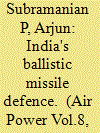

|
|
|
|
|
| Publication |
2013.
|
| Summary/Abstract |
According to a DRDO press statement on November 23, 2012, it successfully tested the indigenously developed Ballistic Missile Defence (BMD) system. After the test DRDO officials claimed that the system will be ready for deployment by 2014. Already, India's BMD project has created ripples in Pakistan. In response to India's pursuit of missile defences, Pakistan has expanded its countermeasure efforts, primarily through development of maneuvering re-entry vehicles. The Pakistan Army strategic Force Command, which controls Islamabad's ballistic missiles, has sunce at least 2004 said it wanted to develop such warheads; analysts now believe these are in service. Moreover, Pakistan continues to increase its inventory of nuclear weapons' land vector by citing India's BMD claims as a destabilizing factor. In addition to this, China has an advanced nuclear and ballistic missile programme. What is more Worrisome is the clandestine nuclear and ballistic missile cooperation between China and Pakistan.
|
|
|
|
|
|
|
|
|
|
|
|
|
|
|
|
| 7 |
ID:
127943
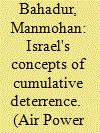

|
|
|
|
|
| Publication |
2013.
|
| Summary/Abstract |
The subject of deterrence is fascinating. Why is it that there are no clearly defined yardsticks that predict the outcome of deterrent situations between adversaries? How is it that David did not get deterred to take on goliath despite his towering strength? Or, how is it that the military might of America did not deter the North Vietnamese in persevering in their efforts to unify their country? Classical deterrence theory did not deter the nineteen Al Qaeda hijackers of four American aircraft from crashing two of them into the World Trade Centre and bringing in a new term in the English lexicon- 9/11. Why do movements or groups like Hamas and Hezbollah periodically launch armed action against Israel knowing full well that their armed might is no match for the technological and military prowess of the Israelis? Why?
|
|
|
|
|
|
|
|
|
|
|
|
|
|
|
|
| 8 |
ID:
128078
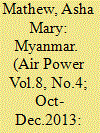

|
|
|
|
|
| Publication |
2013.
|
| Summary/Abstract |
The year 2010 witnessed Myanmar setting out on an elaborate course to put an end to its seclusion and work towards integrating itself with the global system. For years together Myanmar had been slapped with embargoes from the West and had undergone various domestic challenges that have led to chaos within the country as well as hampered relations with neighbouring countries. The current leadership of Myanmar, hence, has a long way to go in order to bring about political stability which the country looks to achieve. It definitely goes without saying that political and economic stability go hand in hand. Myanmar is yet to realize its potential in term of its natural resources and minerals, which if tapped into can generate a lot of wealth, in turn promising better prospects for the country as well as the region.
|
|
|
|
|
|
|
|
|
|
|
|
|
|
|
|
| 9 |
ID:
127909
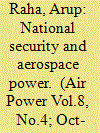

|
|
|
|
|
| Publication |
2013.
|
| Summary/Abstract |
I am happy to be a part of the 10th Subroto Mukerjee Seminar which has been organized by CAPS on a very important subject, "National security & Aerospace Power". I am privileged and overwhelmed to share the same platform with the finest exponents / authority and specialists on national security and aerospace power and it is a great honour to have been invited to deliver the inaugural address at the Subroto Mukerjee Seminar.
|
|
|
|
|
|
|
|
|
|
|
|
|
|
|
|
| 10 |
ID:
127918


|
|
|
|
|
| Publication |
2013.
|
| Summary/Abstract |
At the time Cuban missile crisis in 1962, President Kennedy was presented with a set of alternative courses of action in response to the soviet deployment of nuclear tipped missiles in Cuba. These included undertaking military strikes on the missile bases in Cuba; invasion of the island; or a naval blockade of the country. The American President chose the last option because it was considered the least destabilising. The understanding of his security advisors was that any of the option employing US military force would quickly lead to Moscow retaliating by overrunning Berlin. The US would then have to get into a "general war" Which would, at some stage, require Washington to use nuclear weapons in a first strike, but also be prepared to suffer nuclear retaliation-an option that was described by president Kennedy to his Joint Chief of Staff as "a hell of an alternative".
|
|
|
|
|
|
|
|
|
|
|
|
|
|
|
|